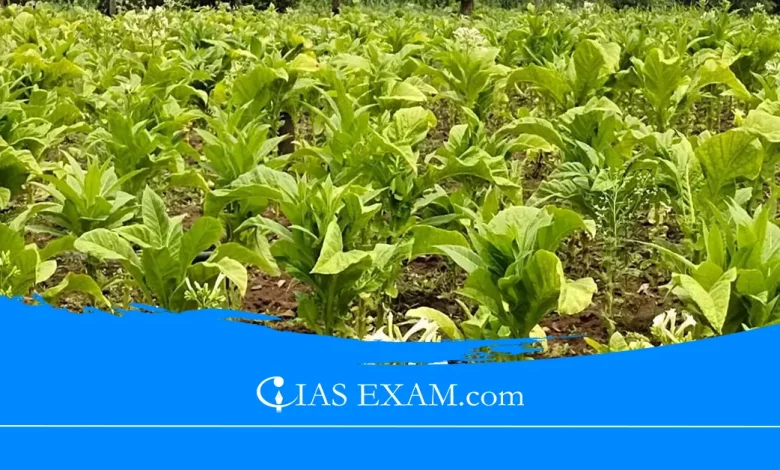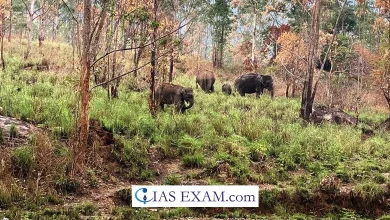Daily Current Affairs for UPSC
Tobacco Cultivation Authorization for Karnataka
Syllabus: Science & Technology, [GS Paper - 3]

Context
- Recently, The Tobacco Board has authorised Karnataka to cultivate and produce 100 million kilograms of its 2024-2025 crop.
- The tobacco cultivation authorization for Karnataka shall enable all approved growers required to register online. Registration starts on 24th March 2024 for all new applicants, and on 27th March 2024 for growers seeking re-registration or relocation of their fields.
About Tobacco Board
- The main responsibilities of the Tobacco Board of India are to supervise, regulate and promote Indian tobacco production.
- The Government of India through the First Five-Year Plan set up the Tobacco Board in 1976, which functioned under Department Commerce then.
- The Tobacco Board is the body in India responsible for regulation and surveillance.
- The board also helps to encourage Indian exports, does R&D, licences growers (and traders), provides a guiding and financial subsidy to farmers.
- The Tobacco Board has a special role to play in tobacco cultivation and trade. It has to manage economic aspects of this activity in view of both public health concerns as well as the need for regulation that if done wrongly could lead to worse results than those anyone was trying for.
- Especially in the unique conditions prevailing in India with tobacco as one major agricultural product.
Administrative process of implementation
- The Regional Manager stressed the necessity of registering in this upcoming season, which will be launched on 27th March 2024. For this reason, he also advised tobacco growers to strictly confine their planting area within that which has been approved.
- They must never step beyond prescribed limits and always register with our board.
- In order to have an abundant and legal harvest it is very important that growers obey these rules. There is no way around it whatsoever!
- In addition to their main crop, tobacco growers are encouraged to cultivate other plants in order to diversify their income. This will help prevent farmers from being caught off guard by possible changes in the market and guarantee long-term survival of their economy.
Tobacco Cultivation Process
- Selection of Seeds and Nursery: Initially required to choose the quality seeds and then nurture and grow them in nurseries.
- Seed Transplantation: As soon as seeds are matured enough, they are moved to fields.
- The Growth Phase: In a continuous manner, periodical care must be taken such as watering the seeds, weeding the seeds and activities of pest control must be done during the growth phase..
- Topping and Suckering: In this stage, the top part & small shoots are removed for enhancing the growth of the leaf.
- The phase of Harvesting: The leaves which are matured are picked by cutting either individually or whole plants.
- Curing Phase: In this stage the leaves which are picked need to be dried through several methods in order to develop flavour.
- Grading and Packing: Once the leaves are flavoured, now the leaves are sorted with respect to their quality and then they are prepared for transportation.
- The Final Processing stage for end use: In this stage the leaves are finally processed to be usable by the end users and the products like Cigarettes or Cigars are produced.
Conclusion
- Tobacco cultivation authorization in Karnataka is crucial for the state’s economy and the livelihoods of many farmers. However, it must be managed with an awareness of health risks and environmental impacts.
- The state faces the challenge of balancing economic benefits from tobacco production with public health concerns and sustainable agricultural practices. Future policies might evolve to impose stricter regulations and possibly shift focus towards alternative, less harmful agricultural products.
Source: The Hindu
UPSC Mains Practice Question
Q.“Considering the economic significance of tobacco cultivation in Karnataka, analyse the challenges and implications of its authorization from an economic, health, and environmental perspective.” [250 Words]





.png)



